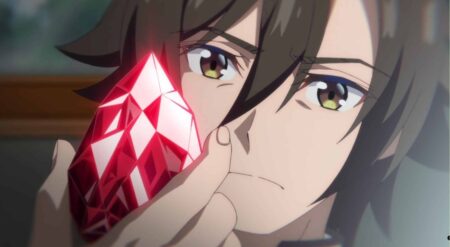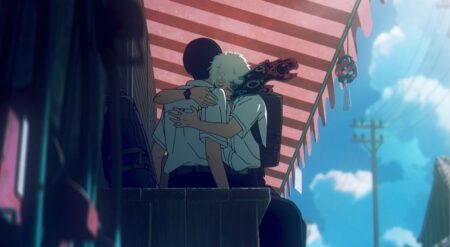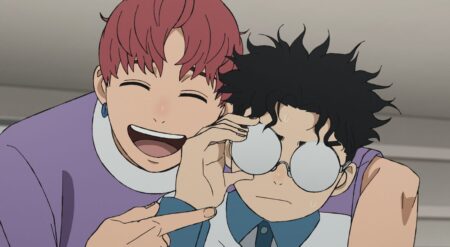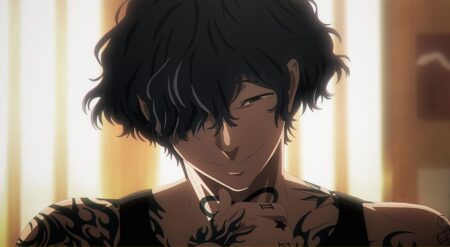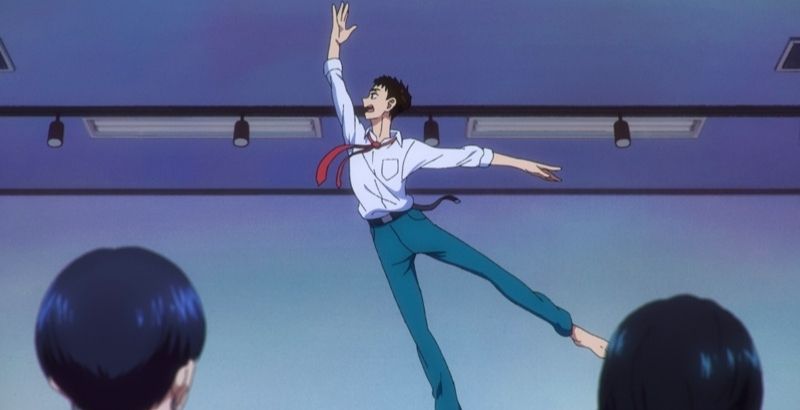
Dance Dance Danseur is a seinen anime produced by MAPPA. When Junpei Murao was young, he discovered he wanted to do ballet. But before he could begin pursuing his passion his father passed away. Believing he needed to carry on his father’s legacy, he set aside ballet for more “manly” pursuits such as jeet kune do. But when a new girl at his school reintroduces him to ballet in Dance Dance Danseur Episode 1, he’ll have to decide what’s more important, fitting in or following his passion.
At the heart of this series’ narrative is the classic conflict between personal desire and what one perceives as culturally normal. What I appreciate the most about how Dance Dance Danseur Episode 1 tackles this well-trodden topic is how it integrates his family into his views of what he should. In particular, his dad.
Rather than being completely for or against Murao’s interest in ballet, his father is allowed a moment that highlights just how much small remarks and initial reactions can impact someone. This moment makes Murao’s dad the vehicle of his insecurities without actually making him the bad guy.
Along with the primary narrative of Murao’s internal conflict, the other major plotline that Dance Dance Danseur Episode 1 introduces is his budding friendship with new transfer student Miyako Goudi. When Goudi approaches Murao about joining her mother’s dance studio, the young man’s love of dance isn’t the only motivation he has. Believing her interest in him to bear a romantic element, Murao is spurred on partly by his desire to get to know the girl.
I think the emotional elements of this story are handled quite well. As both characters are established as roughly 14, the show delivers Murao’s feelings in a way that feels appropriate for his age. He has that youthful infatuation with Goudi that feels like he may not even be sure of quite why he is interested in her. He just knows that the thought of this girl wanting to be around him is pleasing.
Dance Dance Danseur Episode 1 also manages to strike a fine balance with Murao when it comes to his attitude when he is feeling uncomfortable. Like many young male anime protagonists, his knee-jerk reaction when feeling uncomfortable or doubted is to yell and insult the source of his discomfort. As anyone reading this familiar with my tastes will know, this is an anime trope that I feel is often played far too heavy-handedly. Happily, Murao manages to never go too overboard with this aspect of his personality. The insults are kept fairly light and there are never any threats of violence or other elements that the trope often brings that would feel like too much for this grounded story.
As one would expect of a MAPPA production, Dance Dance Danseur Episode 1 delivers some stunning visuals. The dance sequences deliver the grace and motion of ballet beautifully as the camera balances close-up shots that allow the viewer to feel the strain and effort of the dancers with broader angles that allow the full feeling of motion and energy to play across the screen. If you were a fan of how MAPPA delivers figure skating in Yuri!! on Ice, you will love this.
My only qualms with the visual side of this are the general designs of the characters. Everyone in this show looks kind of sickly. If this was just the ballet dancers, I could see it as a presentation of the hardships dancers put their bodies through. But as it is everyone, I feel it is just not a look that doesn’t work for me.
When all is said and done, Dance Dance Danseur Episode 1 delivers a wonderful opening to its story. If it can continue to develop its cast and narrative as skilfully as it has started to here, this feels like it can become a wonderful story of self-acceptance and personal growth.
Dance Dance Danseur Episode 1 is streaming now on Crunchyroll.
Dance Dance Danseur Episode 1 - "There's No Way I'm Doing That Ballet Thing"
-
Rating - 9/109/10
TL;DR
When all is said and done, Dance Dance Danseur Episode 1 delivers a wonderful opening to its story. If it can continue to develop its cast and narrative as skilfully as it has started to here, this feels like it can become a wonderful story of self-acceptance and personal growth.

